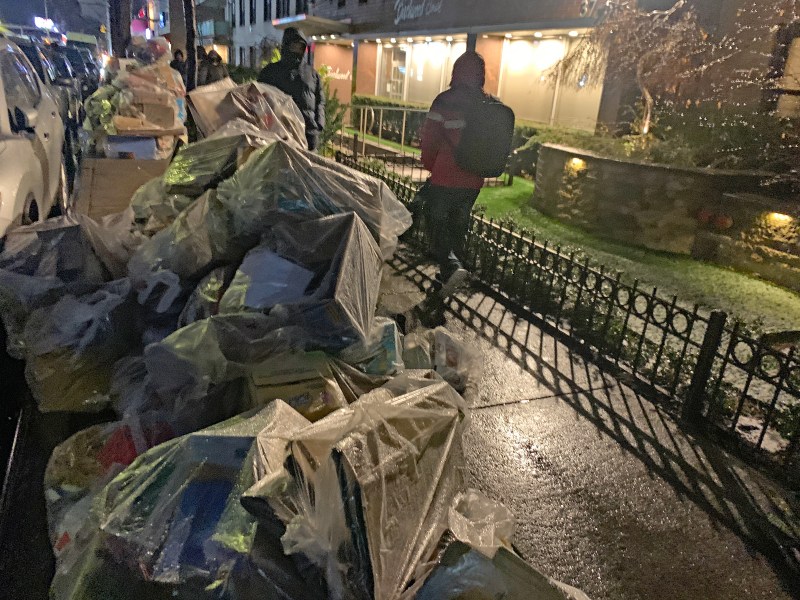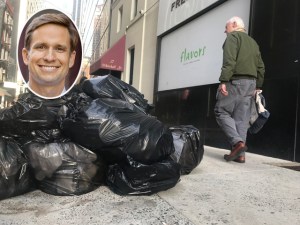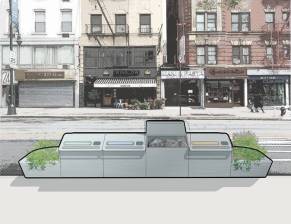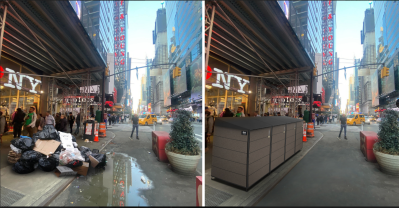Manhattan Community Board Demands Stricter Sanitation Rules for Apartments
Chelsea, long a laboratory for progressive changes, steps up.

Put a lid on it!
The city must enact regulations making apartment houses take greater responsibility for the garbage their residents create, a progressive Manhattan community board is demanding.
Community Board 4, comprising Chelsea, Hells Kitchen, and adjacent areas of the west side, wrote to Sanitation Commissioner Jessica Tisch and Council member Erik Bottcher to outline a raft of new regulations that could curtail New York’s infamous “5 o’clock shadow” — the leaky, stinking, mountains of garbage bags that buildings put out on sidewalks each collection day, impeding pedestrians and attracting rats. The board — which comprises one of the densest areas of the city, where apartments cluster cheek by jowl with many restaurants and bars — voted 46-0 at its September meeting to send the recommendations and offer the neighborhood as a laboratory for change.
“Waste management within buildings has garnered little attention even though the buildings and their occupants are the generators of waste,” board Chairman Jeffrey LeFrancois and Transportation Planning co-chairs Christine Berthet and Dale Corvino wrote in the Sept. 20 letter. “They should bear a large responsibility for keeping the public space clean and free of waste and rodents.”

Such resolutions are only advisory, but CB4’s demarche comes at a pivotal moment for the city’s solid-waste management. The city has embarked on several experiments to containerize trash and get it off the sidewalks — at least one of which already is using the district as a laboratory. DSNY’s “Clean Curbs” pilot program launched its inaugural commercial installation (to date, its largest) in April at the Times Square Alliance, one of New York’s largest and oldest business improvement districts. The inaugural residential installation of Clean Curbs, meanwhile, is set to containerize the trash of several apartment houses on 45th Street between Ninth and 10th Avenues later this fall. And DSNY is studying the use of even larger containers.
(Even New York University is getting in on the “Clean Curbs” pilot, bringing containerized trash enclosures to a residence hall on East 15th Street with the Union Square Partnership, the local business improvement district. It’s the first educational institution to do so.)

Alongside these baby steps, the New York City Housing Authority, with its 162,143 apartments, is launching a much grander effort, Clean Curbs for All, which would use supersized bins hoisted onto trucks with mechanical arms, rather than (as happens now) by the physical effort of New York’s Strongest.
CB4 also is well positioned as civilian advisers to any city effort. LeFrancois is the executive director of the Meatpacking Business Improvement District, which has pioneered various pedestrianized arrangements as well as an on-street trash corral in the service of one of the city’s most desirable shopping and nightlife destinations. Berthet, a longtime force behind the pedestrian-rights group CHECKPEDS, has had a role in the Clean Curbs residential pilot. In 2020, she set up a “guerrilla” curbside garbage corral that the Department of Transportation promptly shut down; still the city noted the effort. Corvino, a writer, performer, and activist, represents important local constituencies.
Key recommendations include:
- Mandating use of rodent-proof containers that can accommodate mechanical hoisting (for the future time when DSNY trucks will have such features).
- Requiring waste compacting and baling for all but the smallest buildings.
- Making more new developments file Waste Management Plans (currently, only those of at least 150 units must do so).
- Requiring that buildings have interior spaces that can hold a week’s worth of trash.
- Mandating that large buildings have a waste-staging area accessible to the street.
- Combining the garbage of smaller buildings in the curb lanes, rather than on sidewalks, in corrals dedicated for the purpose.
There’s a big “if” involved in any such rule making. Any new arrangements for apartment buildings would need buy-in from building service workers and their unions, which have signaled their concerns. For example, SEIU 32BJ, perhaps the largest such local, recently expressed its ire about a proposed DSNY rule putting back trash set-out times, Politico reported. (The union declined to comment for this story. Berthet told Streetsblog that the board tried to involve unions in its discussions but was rebuffed.)
The City Council understands that the mess on the sidewalks needs to change, however.
“The status quo isn’t working, and that should be clear to anyone who walks down the street,” Bottcher said. “New Yorkers are fed up with walking by piles of trash and litter all over the ground. I’m grateful for the incredible work and thoughtfulness that Community Board 4 has put into this report and look forward to working with them, DSNY, and our local communities to move our city’s sanitation practices into the 21st century.”
DSNY spokesman Vincent Gragnani said that the department shares CB4’s goals of “cleaning up our streets, shutting down the rat buffet, and getting bags off sidewalks and curbs” and looks forward to working with it and other advocates.




